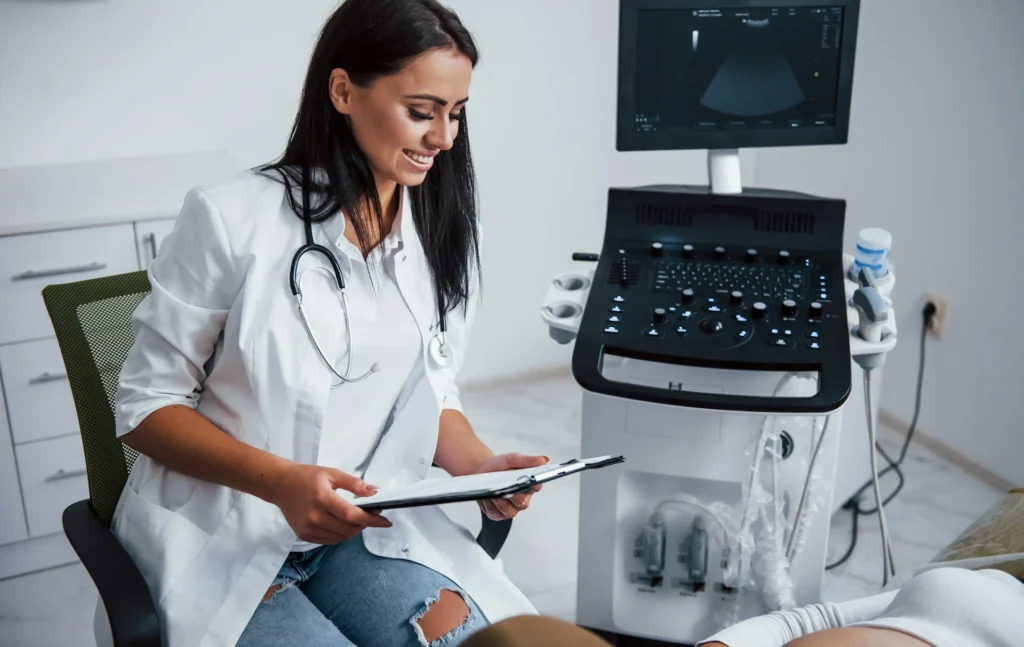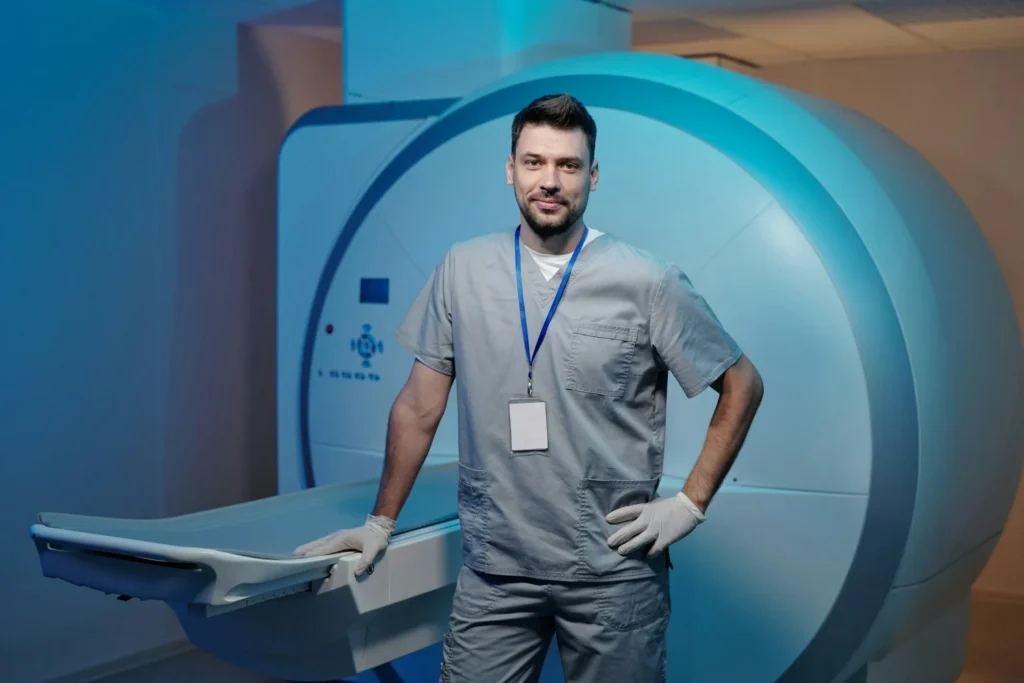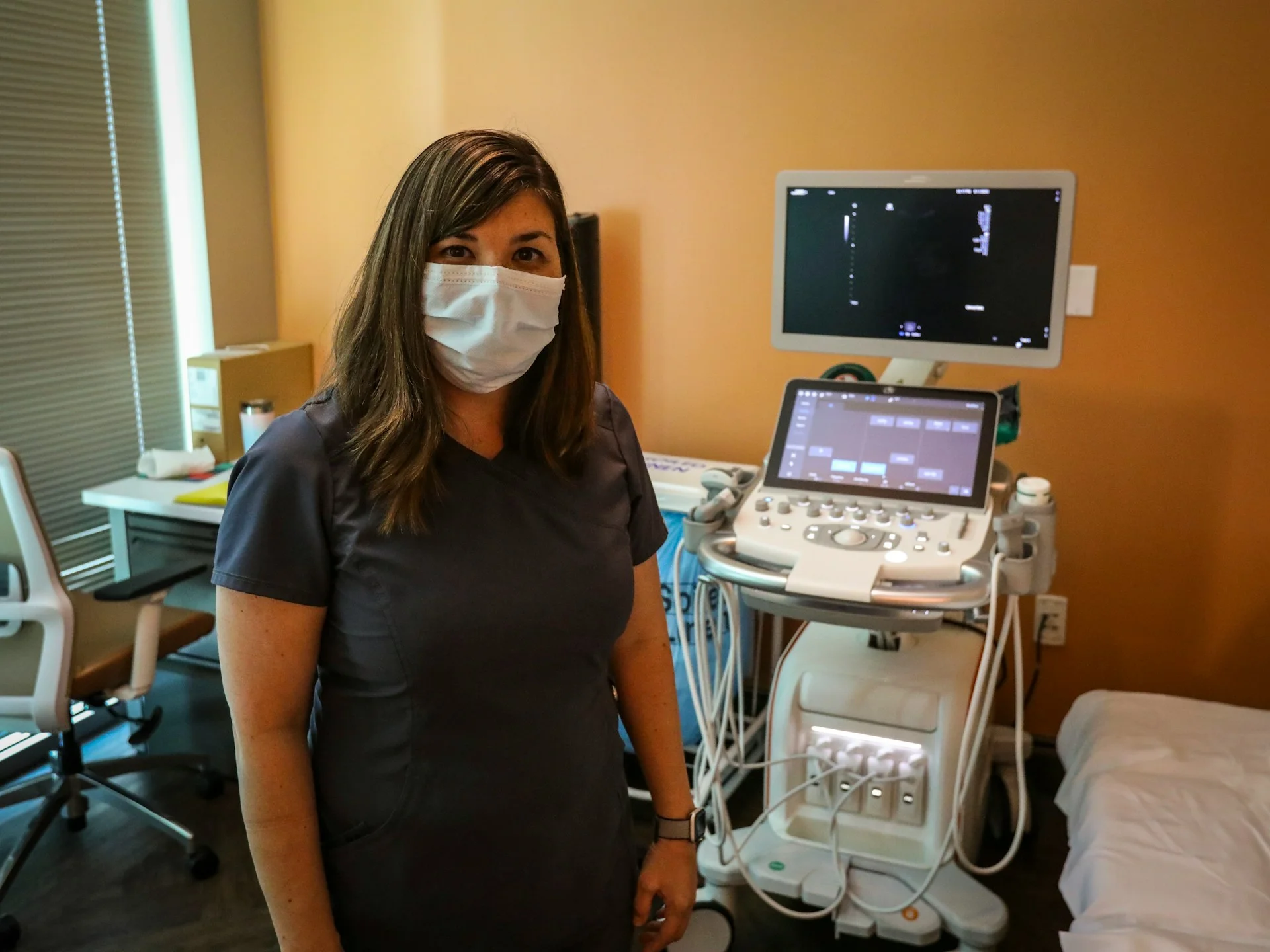Shifting from X-rays to ultrasounds isn’t as far-fetched as it sounds. If you’re a radiologic technologist looking to expand your skill set or pivot into something more specialized, ultrasound might be the next step. So yes, can a radiology tech do ultrasounds? Absolutely, with the right training and certification.
It’s a smart move for those already experienced in diagnostic imaging who want more variety, stronger earning potential, or a role that lets you work closer with patients.
And if you’re thinking about making that move while also exploring travel work, you’re in a great spot. Start browsing RN and allied professions travel jobs here.
Can a Radiology Tech Do Ultrasounds? Let’s Break It Down

Yes, a radiology tech can do ultrasounds, but not without additional education and credentials. Radiologic technologists (also known as rad techs) typically work with X-rays, CT scans, and MRIs, imaging methods that rely on ionizing radiation or magnetic fields. Ultrasound, on the other hand, uses high-frequency sound waves and requires specialized equipment, technique, and patient interaction skills.
How Are Radiology and Ultrasound Technicians Different?
There’s some overlap in the patient-facing aspects of both roles, but the tools and procedures used are significantly different. That’s where the difference between radiographer and sonographer really stands out.
Radiologic Technologist (Rad Tech)
- Works with radiation-based imaging (X-ray, CT, fluoroscopy)
- Often captures static images
- Requires knowledge of radiation safety and protection
- May specialize in emergency, orthopedic, or interventional imaging
Ultrasound Technologist (Sonographer)
- Uses sound waves to capture dynamic, real-time images
- Often works in OB/GYN, cardiology, or abdominal specialties
- Interprets motion-based visuals (e.g., heart valves, fetal development)
- Requires completely different equipment and certification
So if you’re asking, can radiology techs do ultrasounds? The short answer is not without learning an entirely new set of hands-on techniques and technologies.
Explore your options across specialties in our travel allied section to see how flexible your path can be.
What Kind of Training Do You Need to Make the Switch?

To officially become a sonographer, you’ll need to enroll in an accredited diagnostic medical sonography program. These are often offered as one-year certificate programs for those who already hold a degree in radiologic sciences or another healthcare-related field.
After completing your coursework and clinical hours, you’ll be eligible to sit for the ARDMS (American Registry for Diagnostic Medical Sonography) exam, or CCI or ARRT’s sonography exam, depending on your specialty and the state you plan to work in.
In short: can a radiologic technologist do ultrasounds? Yes, but it will take anywhere from 12–18 months of targeted education and clinical training.
Why Would a Rad Tech Want to Switch to Sonography?
There are a few strong motivators for making this career move:
1. Better Pay
Ultrasound technologists typically earn more on average than general X-ray techs. In fact, according to recent BLS data, sonographers make around $10,000–$15,000 more per year.
2. Specialization
Sonography offers more defined specialty paths: OB/GYN, vascular, abdominal, cardiac, and even musculoskeletal ultrasound. This allows for more control over your work environment and patient demographics.
3. No Radiation
Some healthcare professionals prefer the non-ionizing nature of ultrasound. You’re not exposed to radiation, and many patients are more relaxed during these procedures.
4. Travel Potential
As a radiology ultrasound tech, your expanded skill set makes you even more valuable in the travel healthcare market. That means more choices, better contracts, and more negotiating power.
If you’re already a traveler or thinking about it, check out our active radiology tech travel jobs to see what’s open now.
How to Transition From Rad Tech to Sonographer: Step-by-Step
If you’re ready to take the leap from radiology to ultrasound, here’s what that roadmap usually looks like:
Step 1: Research Certificate Programs
Look for a CAAHEP-accredited diagnostic medical sonography program designed for allied health professionals. These programs usually last 12–18 months.
Step 2: Enroll and Complete Required Coursework
You’ll cover topics like:
- Physics of ultrasound
- OB/GYN scanning techniques
- Vascular imaging
- Abdomen and small parts
Step 3: Get Clinical Hours
Hands-on clinical experience is mandatory. You’ll work under a preceptor and log required hours to qualify for certification exams.
Step 4: Sit for Certification
Most employers require ARDMS, ARRT (S), or CCI credentials before hiring. Choose the certifying body based on your preferred specialty and where you plan to work.
Step 5: Apply for Jobs
Once certified, you can start applying for ultrasound roles, locally or as a traveler.
So if you’ve ever asked, can a rad tech become a sonographer? that’s your roadmap.
What’s the Demand Like for Sonographers?

Sonographers are in high demand across the U.S., especially in specialties like cardiac and OB/GYN. The job outlook is expected to grow 10–15% over the next decade, outpacing many other healthcare roles.
That’s why now is a smart time to explore whether you can be an ultrasound tech with a radiology degree—because the path is open, and the market is ready.
And if you’re already working and want to combine travel flexibility with career growth, take a look at our open travel RN and allied roles.
What Should You Consider Before Making the Switch?
While the idea of switching specialties is exciting, it’s not without trade-offs.
- Time & Cost: Even with a radiology background, you’ll need to invest 12–18 months in additional education.
- Cert Requirements Vary by State: Some states don’t require licensing, while others do. Make sure you check local laws.
- Clinical Placement May Be Competitive: Especially for popular specialties like OB/GYN.
But if you’re motivated, already experienced in imaging, and enjoy direct patient interaction, the switch can be one of the most rewarding decisions you make.
FAQs About Radiology and Ultrasound Technicians
Can a radiology tech do ultrasounds?
Yes, but they must complete a sonography program and earn certification, since ultrasound involves different imaging technology and techniques than radiology.
Can radiology techs do ultrasounds without certification?
No. Employers generally require certification from ARDMS, ARRT (S), or CCI. Practicing without credentials is illegal in many states and unsafe for patients.
Can a radiologic technologist do ultrasounds with on-the-job training?
Not typically. Most states and employers require formal sonography training and certification—even if you already have a radiology degree.
What’s the difference between radiology and ultrasound tech roles?
Radiology techs use radiation-based machines like X-rays and CT scanners. Ultrasound techs use sound waves to produce real-time images. Both assist in diagnosing patients but use completely different tools.
What’s the average salary for ultrasound techs vs radiologic techs?
Ultrasound techs earn about $10,000–$15,000 more per year on average. Salaries depend on experience, location, and specialty.
Is it hard to become a sonographer after being a rad tech?
It’s not hard, but it takes time. With a radiology background, you can fast-track through a 12–18 month certificate program and become certified quickly.
How fast can a radiology tech do ultrasounds?
If you already have a degree in radiologic technology, you can often complete a diagnostic medical sonography certificate in as little as 12 months. Some programs may be longer depending on clinical requirements and state regulations, but your imaging experience gives you a strong head start.
Are radiology and ultrasound technicians licensed the same way?
No. Radiologic technologists typically get certified by ARRT, while ultrasound techs are certified by ARDMS, CCI, or ARRT in Sonography.
Can you be an ultrasound tech with a radiology degree?
Yes. Your existing degree can be the foundation for enrolling in a 1-year sonography certificate program, making the career shift relatively smooth.


 and then
and then